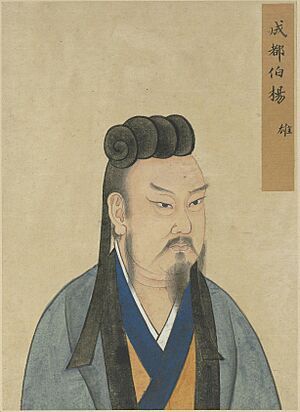Yang Xiong (author) facts for kids
Quick facts for kids Yang Xiong |
|||||||||||||||||||||||||||||||
|---|---|---|---|---|---|---|---|---|---|---|---|---|---|---|---|---|---|---|---|---|---|---|---|---|---|---|---|---|---|---|---|

Medieval representation of Yang Xiong
|
|||||||||||||||||||||||||||||||
| Traditional Chinese | 揚雄 | ||||||||||||||||||||||||||||||
| Simplified Chinese | 扬雄 | ||||||||||||||||||||||||||||||
|
|||||||||||||||||||||||||||||||
Yang Xiong (Chinese: 揚雄; 53 BCE – 18 CE) was a Chinese philosopher, poet, and politician of the Western Han dynasty known for his philosophical writings and fu poetry compositions.
Life and career
Like a number of the other well-known writers of the Han dynasty, Yang was from Shu (modern Sichuan province), specifically the area of Pi (modern Pi County, Sichuan). Yang claimed that his family had moved south from the state of Jin during its civil infighting in the 6th century BCE. As a youth Yang was an admirer and imitator of his elder Shu compatriot Sima Xiangru and the "grand fu" style of the early Han period. His ability and success in fu composition earned him a summons to the imperial capital at Chang'an to serve as an "Expectant Official", responsible for composing poems and fu for the emperor.
Yang's position required him to praise the virtue and glory of Emperor Cheng of Han and the grandeur of imperial outings, but he was disturbed by the wasteful extravagance of the imperial court. Yang attempted to return the fu genre to a focus of "suasive admonition" (諷; fèng), which he believed was the original purpose of the earliest fu-type writings of Qu Yuan, but his couched admonitions against extravagance went unnoticed and unheeded by Emperor Cheng.
Yang's most famous work is the Fayan, a philosophical work modeled on the Analects, in which Yang criticizes fu writers for focusing on ornate, esoteric language while ignoring more important issues of morality. Yang's other works include the Taixuanjing, a divination text based on the I Ching, "Justification Against Ridicule" (解嘲; Jiě cháo), one of the best known examples of the "fu of frustration" subgenre, and the Fangyan, a dictionary documenting regional vocabulary from throughout China at the time.
Together with Sima Xiangru, Yang was one of the most famous and illustrious figures of the entire Han dynasty. The Book of Han devotes a full two-part chapter to both Yang and Sima, an honor surpassing that of even the most famous generals and ministers.
Philosophy
Yang did not believe human nature was inherently good as Mencius (fl. 4th century BCE) had written, nor inherently bad as Xunzi (c. 300–230 BCE) had written, but came into existence as a mixture of both. He was a close associate of the official and philosopher Huan Tan (d. 28 CE), an Old Texts realist who may have heavily influenced the works of Wang Chong (27–c. 100 CE). Yang is also known for his protest against the verbosity of the fu. He was hailed by Huan Tan as the "Confucius from the western parts".

